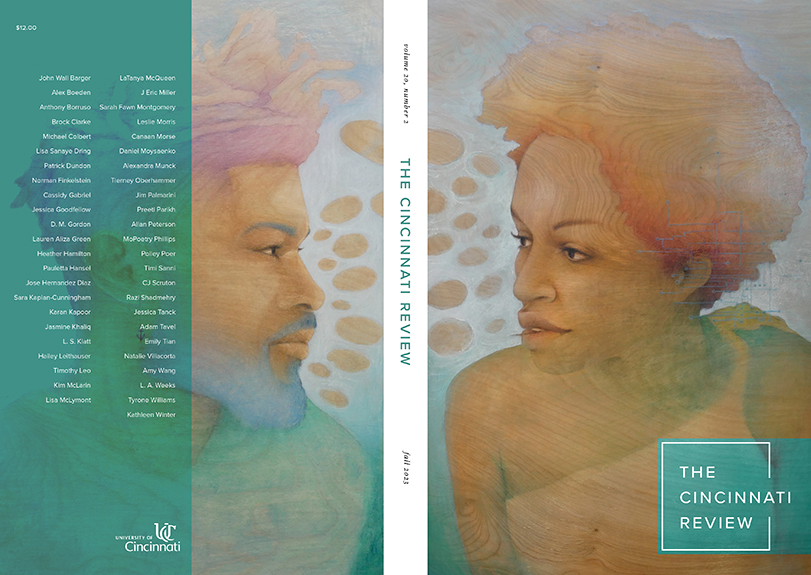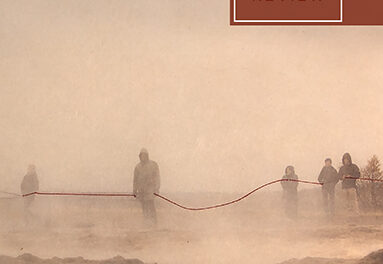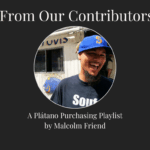In Issue 20.2, one of our twentieth-anniversary issues, we present a special feature on where writing lives in Cincinnati. We reached out to six writers who are current or former residents of the city, giving them the following prompt:
We’ve been thinking about Cincinnati as the site of intersections: of North and South, with the subversive crossing between them by the Underground Railroad; of the geography shaped by an advancing and then retreating glacier, the Ohio River, and the hills; of the Indigenous Algonquian speaking tribes, including the Delaware, Miami, and Shawnee tribes, whose land was taken by white settlers as it became known as Losantiville in 1888. We’re interested, also, in thinking about how the diverse strands of our literary community intersect (or not) here in Cincinnati. Though our various groups focused on creative writing have sometimes felt like separate silos, the Cincinnati Poet Laureate position, the Cincinnati and Hamilton County Public Library writer-in-residence program, and other initiatives like it are breaking down those divisions at times. What is the story of Cincinnati and its literature(s), from your point of view? Where does writing “live” here?
We’re pleased to share here MoPoetry Phillips’s contribution to the conversation. (Read the entire feature here.)
At nine years old, I was forced into my room with a journal and pen after an attempted sexual assault by three of my neighbor’s much older sons and after inappropriate gazes and behavior from a family member. Even years later, as an adult, I had tears in my eyes as I wrote the poem “My Near Miss,” which is included in my book Equals Greatness. I tapped back into the hurt of that moment: “I’ve been told to talk. To tell if anyone has touched me, but how do I explain this feeling of violation, that tore holes in my flesh without penetration.” Slowly but surely, writing started to become therapeutic. It was a constant friend, especially during the most crushing times of my life. When I escaped domestic violence, I wrote, “My mind had been taken apart like small puzzle pieces. It lingered around hoping someone could unscramble the mess and reveal the true picture from the varied pieces of memories.”
My “true picture” ended up propelling me into mental-health advocacy, domestic violence prevention, motivational speaking, and empowering others. I began to design programming, including “The Progression of Violence” and “Thriving After Survival” workshops taught at Northern Kentucky University, University of Cincinnati, University of Detroit Mercy, Youngstown University, and Ohio University. In October 2021, a social-media post of my poem “PTSD,” which describes how post-traumatic stress disorder caused by domestic violence is viewed differently from PTSD experienced by veterans, received national attention. It led to a core team of other mental-health advocates and spoken-word artists—Tracy “T-Spirit” Stanton (St. Louis), Tonyela “MasterPiece” Arphul (Dallas), Ed Mabrey (Los Angeles), and I—teaming up yearly to curate the Regal Rhythms Poetry Survivors Ball here in Cincinnati. With the help of our sponsors (the Mayerson Foundation, Tristate Trauma Network, Women Helping Women, Recovery Center of Hamilton County, Northern Kentucky University, and Women Writing for (a) Change), this ball, an open mic for trauma survivors, and six workshops help people learn the power of sharing their survivor stories. For me, writing as therapy happens in the Cincinnati area for so many kinds of people and in so many settings: young adults in recovery centers, women finding their voices, exonerees, and even corporate workers.
As I continued to use writing therapy in my own work as cofounder of Regal Rhythms Poetry and founder of Hit the Mic Cincy, I began to connect with and be inspired by others who valued the power of writing and used it in their places of work, especially Amanda Stoddard and Donna Mayerson. Stoddard, of the Recovery Center of Hamilton County, says that her love for the arts began with music, because “growing up, there was a lot of emotional dysfunction around me.” Her love for words was rewarded when she won second place for her Martin Luther King Jr. poem about equality in the fourth grade. She would later use a combination of rapping and poetry to open her first open-mic night in her freshman year of college. She says, “Writing was the one thing that constantly helped me regulate. . . . Without those tools and writing, I don’t necessarily think I’d be here having this conversation with you.” As she moved to her position with the Recovery Center of Hamilton County, she noticed that they already had creative-writing classes. However, Amanda was the first to introduce writing therapy to a very underserved population known as transitional youth, those who are eighteen to thirty years old, and who are rarely given programming services. In 2019 she started a Writing for Healing Workshop with Katarina Knehans for these youth, known as RC After Dark. Now Stoddard is a certified peer-recovery supporter and trainer through the Ohio Department of Mental Health and Addiction Services, and certified in trauma-responsive care through Tristate Trauma Network.
Amanda’s true gift is what she refers to as “curating prompts to evoke emotion.” Her writing prompts go beyond the surface level of your emotions to reach the real issues that need to be discussed and disclosed. In an article in the British Journal of General Practice, Soul Mugerwa and John Holden point out that “disclosure in the form of the spoken word has long been considered beneficial and widely used in counseling and other therapies.” Writing therapy improves your physical health, boosts your immune system, and helps employees have fewer missed days due to illness. Mugerwa and Holden also say that writing helps you cope with and process traumatic events, because “writing may facilitate cognitive processing of traumatic memories, resulting in more adaptive, integrated representations about the writer themselves, their world, and others.” For example, I was able to face my life much better after I attended RC After Dark. I am a witness that you feel the warmth and connection as soon as you step into the room. I had been involved with several writing communities, but I found myself releasing onto the page like never before while I was there. It wasn’t until I elected to share my writing with the group that I understood the full impact of my emotions. It was so surreal, like reading someone else’s words, but they helped me face my deepest thoughts and feelings.
Amanda says many people have felt better after the writing circles; they said they felt lighter, had more clarity, and were more positive about what they were dealing with. Writing therapy helped in her personal life to regulate her emotions, deal with past traumatic events, and cope with her physical battles with endometriosis. Amanda also described the regulation process and how writing takes you from having an emotional and physical stress response, with increased heart rate, uneasiness, and anxiety, to a much calmer place with a lower heart rate and a sense of being more grounded. She says, “Writing helps over time by taking those traumatic memories from the limbic system known as the fear center into the processing brain known as the prefrontal cortex.” Those words alone were empowering for me because I began to see writing as a rerouting tool.
Experiencing writing therapy impacted me not only while I was at RC After Dark: there are lasting effects that I still carry to this day. In fact, I now wholeheartedly agree with Amanda Stoddard’s observation that “writing has been something that fundamentally changed the trajectory of my life.” I learned to lean heavily upon it to find my voice, and it equipped me with the power of expression. Most importantly, it taught me how it felt to be held within a safe space, to express myself and be vulnerable. As a result, within a year, I had taken a leap to become a certified writing-group facilitator through Women Writing for (a) Change, because I wanted to create a safe space for people in that same way. This journey led me to Dr. Donna Mayerson.
Mayerson is a trustee of the Mayerson Foundation and the clinical director of the Ohio Innocence Project. I first started working with the OIP when I began facilitating writing groups. Mayerson, a licensed psychologist in the state of Ohio, sat with me during writing groups with exonerees and their families, sharing as a participant and giving valuable feedback after the writing circles. Although I was still trying to find my way as a new facilitator, to develop my own style and learn to be moved by my own intuitions and faith, she spoke frequently about the “magic” that was occurring during the writing circles. The practices I learned at WWf(a)C focus on the emotions experienced. Those writing are encouraged to ignore grammar, spelling, and sentence structure. You are to avoid your inner critic; instead, you are taught to focus on getting something on the page. This allows you to be more transparent and free to express yourself, which can increase your ability to communicate with others as well as find a safe outlet to reduce stress. I realized that writing therapy would be very useful even for corporations wanting better interactions between staff and to improve the overall work experience.
After speaking with Dr. Mayerson further, I discovered that over the previous five years, she was responsible for introducing art therapy to the Ohio Innocence Project’s work with exonerees and their families. Many who were wrongfully convicted and later released didn’t trust traditional, clinical therapies because walking into an office to talk about their experiences was uncomfortable. Mayerson says, “Artistic, creative expression can be very curative, particularly when there is a focus on resilience.” Donna has used various types of arts therapy including music, with the organizations Songwriting with Soldiers and Alive Inside, and she has encouraged several of the exonerees to use art as their form of expression. She says that after I introduced writing therapy into the OIP through poetry group facilitation, “they still say to this day it opened up something in them.”
Over the last four years, I have connected with companies that wanted to have a commissioned piece written about their company mottos and mission statements, to display on their walls and encourage their staff. I’ve been called into webinars and meetings to provide spoken word. I have performed and facilitated writing during breakout sessions for mental health organizations like Tristate Trauma Network and Mental Health America. As I facilitate, I see their tears, much like my own when I was a participant for the first time. I remember the words of Donna Mayerson, that this work is curative when the focus is on resilience, so I allow that to be a guiding force. I learned to intentionally stay after a session to hear the private stories and give and receive one-on-one feedback. Many share about the people they lost during the pandemic, and the struggles they face at home and at work, how hard it is to prioritize their self-care, find work/life balance, and reduce stress, and they say they feel much better after writing. The raw emotion shown in their work always leaves me still thinking about them as I drive home. Weeks, months, and now years later, I hope they still carry the inspiration, strength, and courage they found by being prompted to write and encouraged to share their writing. Writing therapy has led me to continue to expand the mission for my company Regal Rhythms Poetry LLC. We are now “connecting artists to opportunities” and curating spoken-word events for corporations, schools, and organizations. Within the last five weeks, we have referred and/or curated spoken-word and teaching-artist positions for almost fifty artists, and the calls are still pouring in. Spoken word can transform the corporate world and has been making its mark within Cincinnati and the surrounding areas as an integral component to healing and promoting better physical and mental outcomes.
MoPoetry Phillips is a national spoken-word artist, cofounder of Regal Rhythms Poetry, and founder of Hit the Mic Cincy. Her work has been featured in venues such as the Voices Project and SOS ART Cincinnati, and her self-published book is Equals Greatness. She has been highlighted locally in the Cincinnati Enquirer, Cincinnati Herald, and Street Vibes, and on Urban One radio, WCVG, and WVXU.









